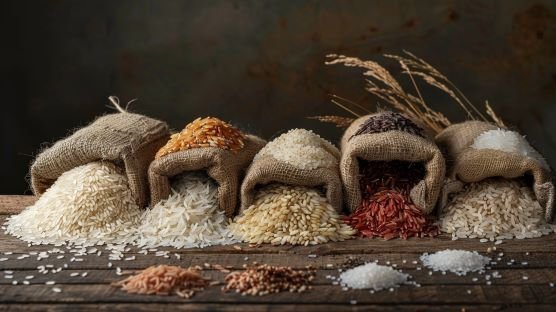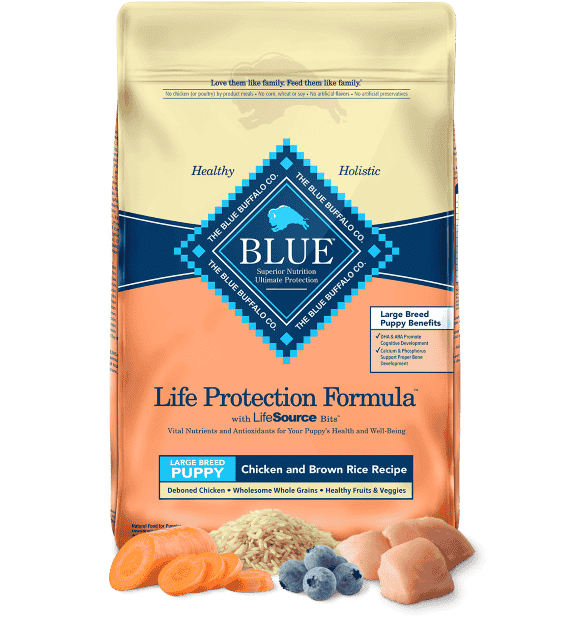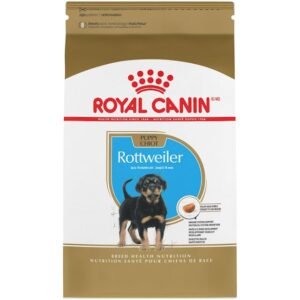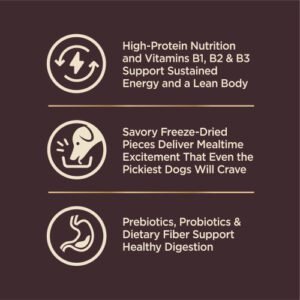What’s the best Dog Food for Rottweilers ?
The Rottweiler is a fearless breed of dog that has the potential to be strong and grouchy. They were originally used for herding livestock as well as pulling carts for butchers, but they have grown into one of the most common working breeds still in use today. They are commonly used in search and rescue, police work, and serve as guard dogs.
Rottweilers are known for their massive, wide chest and recognizable short black coat with tan markings on the face, paws, and chest. The breed is smart, bold and protective making them ideal for or experienced dog owners able to offer coveted training and socialization.
Rottweilers can be quite affectionate and loyal to the right family. They will be gentle and playful, especially if they have been trained right. When you combine that with their strength, and a calm and confident temperament, they are a very dependable breed.We will go over the best dog food for Rottweilers in this extensive article, with special attention to their nutritional requirements at various life phases, important ingredients to search for, and how to decide between homemade, wet, and dry food. Let’s examine the elements you must take into account to guarantee your Rottweiler has the healthiest diet possible.
Understanding the Nutritional Needs of Rottweilers
Prior to getting into particular dog food brands and varieties, it’s critical to comprehend the dietary requirements of Rottweilers. Since Rottweilers are big breeds with naturally muscular bodies, they need a diet high in certain nutrients to keep their muscle mass, support their joints, and enhance general health.
Protein Requirements
First and foremost, the most important food item for a Rottweiler is protein. This is so they may keep their natural muscle mass and strength. Rottweilers are naturally muscular canines. Because of this, a large portion of their diet ought to consist of premium animal protein sources including fish, poultry, lamb, and cattle. More protein is especially necessary for puppies’ growth and development.
Fat for Energy
Particularly when they are younger, Rottweilers are very energetic canines. Because of this, individuals need to consume enough fat in their diet to maintain their energy levels. Good fats—like those found in fish or chicken fat—are crucial for maintaining the lustre of your Rottweiler’s coat and promoting cognitive health. To prevent weight gain, it’s crucial to balance the dog’s consumption of fat, particularly as the dog gets older and less active.
Carbohydrates for Digestive Health
Even though dogs are mainly carnivores, carbs should be a part of your Rottweiler’s diet, especially for his or her digestive system. Dietary fibre from whole grains, such as barley, oats, and brown rice, facilitates digestion.

Furthermore, some carbs release energy gradually, which is advantageous for keeping your dog energetic all day.
Joint Support and Bone Health
Rottweilers need to eat foods that promote bone and joint health because they are prone to joint problems like hip dysplasia. The two essential minerals chondroitin and glucosamine are frequently found in dog food recipes made for large breeds. Furthermore, healthy bones and teeth depend on calcium and phosphorus.
Weight Management and Obesity Concerns
If their nutrition isn’t closely watched, Rottweilers tend to acquire weight. Numerous health concerns, including as diabetes, heart disease, and joint problems, can be brought on by obesity. As a result, it’s critical to feed your Rottweiler a balanced diet that satisfies their energy requirements without causing them to put on extra weight.
Vitamins and Minerals
Protein, lipids, and carbs are the three main elements that Rottweilers require, but they also require a variety of vitamins and minerals to be healthy. Antioxidants such as vitamin C and E help their immune system, while vitamin E and omega-3 fatty acids are great for keeping their skin and coat healthy and lustrous. Additionally, B vitamins support proper red blood cell production and energy metabolism.
Life Stage Considerations for Rottweiler Nutrition
Depending on their life stage, rottweilers require varied diets. Diets specifically designed for puppies, adults, and older citizens are necessary to guarantee that they get the right nutrients for growth, energy, and general health.
Rottweiler Puppies (2-12 months):
Building a Strong Foundation: Rottweilers go through a period of fast growth when they are puppies. They require a diet that helps their immune system, growing muscles, and growing bones. This is why it’s crucial to feed your puppy a high-protein meal that has extra calcium and phosphorus for healthy bone growth. Seek out puppy formulas made especially for large breeds; these will contain the right amounts of nutrients to promote consistent growth without overtaxing growing joints.

Additionally, puppy food should contain DHA (docosahexaenoic acid), an omega-3 fatty acid that is crucial for brain development and learning.
Adult Rottweilers (12 months- 7 years):
Maintaining Muscle and Health:Your Rottweiler’s nutritional requirements change after they reach adulthood, which typically happens between the ages of 18 and 24 months. Adult Rottweilers still need a lot of protein to maintain their muscle mass, but they also need a healthy balance of lipids to maintain their energy levels and avoid gaining weight.
Furthermore, because of their size, mature Rottweilers are more susceptible to joint problems and would benefit from glucosamine and chondroitin to maintain their joints. Large breed adult formulations will usually have these elements in the right proportions. Additionally, meals high in antioxidants help adult dogs retain a robust immune system and foster long-term health.
Senior Rottweilers (7 years and up):
Supporting Aging Bodies:Rottweilers’ ageing metabolism and activity levels should be taken into consideration while designing their food. Senior Rottweilers require a diet high in protein to maintain muscle mass but low in calories to avoid weight gain. Furthermore, as an added precaution against joint issues, food for senior dogs should have higher concentrations of glucosamine and chondroitin to promote joint health.
Senior Rottweilers are particularly concerned about digestibility. Probiotic-rich and high-fiber foods can improve digestion and help avoid problems like constipation. In addition to extra vitamins and minerals to assist ageing eyes, hearts, and immune systems, senior dog food recipes frequently contain substances that improve digestive health.
Key Ingredients to Look For in Dog Food for Rottweilers
Make sure you’re selecting the best dog food for your Rottweiler by carefully reading the ingredient list when you go grocery shopping. These are the essential components to search for:
High-Quality Protein
- As mentioned earlier, protein is essential for maintaining your Rottweiler’s muscle mass and overall health. Look for high-quality animal protein sources like chicken, turkey, beef, lamb, or fish as the first ingredient.
- Avoid dog foods that rely heavily on plant-based proteins, such as soy or corn, as these are less digestible for dogs and provide fewer essential amino acids.
Healthy Fats
- Healthy fats, such as those from chicken fat, fish oil, and flaxseed, are essential for maintaining your Rottweiler’s energy levels and promoting a shiny coat. Omega-3 fatty acids are particularly beneficial for skin health, cognitive function, and joint support.
Whole Grains or Carbohydrates
- While dogs don’t need a high-carb diet, some carbohydrates provide fiber and energy. Look for whole grains like brown rice, oatmeal, and barley. Alternatively, if your Rottweiler has a grain sensitivity, opt for grain-free options that use sweet potatoes or peas as alternative carbohydrate sources.
Glucosamine and Chondroitin
- These two compounds are essential for maintaining joint health, particularly in large breeds like Rottweilers. You’ll find them in most large-breed dog food formulas, but you can also supplement them if needed.
Antioxidants and Vitamins
- Antioxidants such as vitamins C and E are crucial for supporting your Rottweiler’s immune system. Additionally, B vitamins, vitamin A, and minerals like zinc and selenium are vital for maintaining healthy skin, eyes, and overall vitality.
Best Dog Food Brands for Rottweilers
Why It’s Good:
Why It’s Good:
Why It’s Good:This grain-free option is packed with high-quality animal proteins and has the added benefit of freeze-dried raw meat, which many dogs love. It’s a good choice for maintaining muscle mass and supporting energy levels.
| Nutrient | Percentage / Amount |
|---|---|
| Crude Protein (min.) | 35.0% |
| Crude Fat (min.) | 15.0% |
| Crude Fiber (max.) | 4.50% |
| Moisture (max.) | 10.0% |
| Calcium (min.) | 1.50% |
| Phosphorus (min.) | 1.00% |
| Zinc (min.) | 100 mg/kg |
| Vitamin A (min.) | 25,000 IU/kg |
| Vitamin E (min.) | 400 IU/kg |
| Thiamine (min.) | 5.00 mg/kg |
| Riboflavin (min.) | 7.50 mg/kg |
| Niacin (min.) | 50.0 mg/kg |
| Biotin* (min.) | 0.10 mg/kg |
| Taurine (min.) | 0.20% |
| Omega-6 Fatty Acids (min.) | 3.50% |
| Omega-3 Fatty Acids (min.) | 0.50% |
| Glucosamine* (min.) | 1,200 mg/kg |
| Chondroitin Sulfate (min.) | 700 mg/kg |
| Total Microorganisms (min.) | 100,000,000 CFU/lb |
*Not recognized as an essential nutrient by the AAFCO Dog Food Nutrient Profiles. Contains a source of live (viable) naturally occurring microorganisms.
More About Dog foods.
1-Best Inexpensive Dog Food for Large Breeds
2-Best Dog Food for Giant Breeds:
3-Best Wet Dog Food for Small Breeds
4-Best Dog Food for Small Breeds
5-Dry Dog Food for Small Breeds
7-Is Pure Balance a Good Dog Food?
8-Is Blue Buffalo Good Dog Food?
9-Is Purina Pro Plan a Good Dog Food
10-The Best Dog Food for Poodles
11-Best Dog Food for Golden Retriever Puppies
12-Best Dog Food for Siberian Husky
13-Best Dog Food for Dachshunds:
14-Nature Dog Food: The Best Choice for a Healthy Dog
15-Best dog food for French bulldogs
16-American Natural Premium Dog Food
17-The Importance of Dog Food Protein:
19-Where to buy the farmer’s dog food?
20-Best dog food for cane corsos
22“Best Dog Food for Allergies:”
23-Hydrolyzed Protein Dog Food:
24-The Best Guide to Organic Dog Food?
25-What can I Feed My Dog over dog food?
26-Top Guide to Freeze Dried Raw Dog Food
28-Is Merrick Dog Food Good for Your Dog?
30-Is Cesar Dog Food Good 5 Surprising facts
31-Is Royal Canin a Good Dog Food?




Thanks for posting. I really enjoyed reading it, especially because it addressed my problem. It helped me a lot and I hope it will help others too.